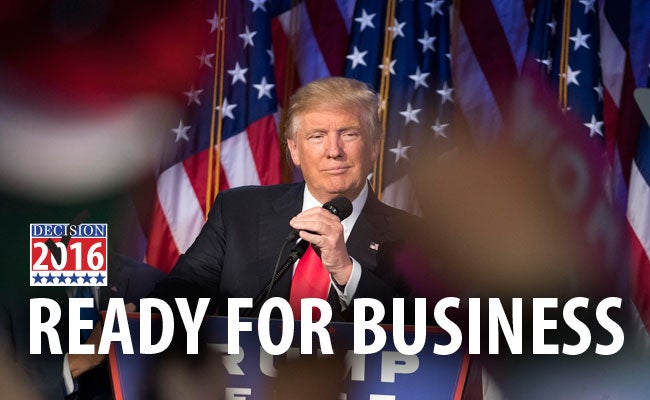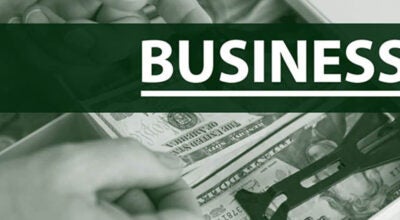Sunday focus: Trump presidency brings hope to local business people
Published 12:33 am Sunday, November 13, 2016

- President-elect Donald Trump speaks to supporters at the election night party at the Hilton Midtown Hotel in New York City.
A Donald Trump presidency could be just what the Miss-Lou economy needs, area business people say.
Local growth and development that first took blows when major industries, including International Paper, closed in the 1990s and 2000s took yet another stomach punch in recent years when President Obama’s administration implemented regulatory impediments on the oil and gas industry and oil trade opened up with Iran.
Jody Helbling, the general manager of Energy Drilling Company, said his company is down more than 100 employees.
“Lots of oil field people are out of work in our area,” Helbling said. “We are 100 to 120 people down from where we were just a year and a half ago.”
If Trump reverses course on regulations and international trade, the impact could be significant in the Natchez area, Helbling said.
“Just our company alone stands to add 100-plus jobs,” he said. “That’ll be big.”
Helbling was in Houston — the oil capital of the U.S. — this week, and attitudes are a lot better than they have been in a long time.
“I’ve been coming to Houston on and off for two years,” he said. “This is the most optimistic I have seen people. A lot of people are starting to feel good about the economy.”
If Trump can eliminate the executive order that took sanctions away from Iran, Helbling said it would take 1 million barrels of oil off the market a day.
“Cheaper oil and gas is good for you when you are putting oil and gas in your car,” Helbling said. “But over 1 million people are out of work from the oil field.
“They are not making money. They are not buying cars, shopping in malls, traveling, eating at restaurants or going to gyms. It just runs the whole economy down. Getting those people back to work is far more important than saving a few dollars.”
For eight years, the administration has shoved regulations down the oil industry’s throat including taking away tax benefits and adding expenses, Helbling said.
“I think some of that will be relaxed,” he said. “If I had Donald Trump’s ear, I would tell him to be pro business, be pro energy. Let’s shoot to have American independence and not worry about buying oil and gas from Russia, Saudi Arabia and other places.
“Lets put these jobs in America,” Helbling said.
Trickle down
Chad Gamberi, with Gamberi’s Feed and Farm Supply, said the oil industry impacts Natchez in other ways beyond just the oil field.
Look at a November during hunting season, he said.
“What do you see a lot of? Deer hunters,” he said. “They are spending money in restaurants, with me and all over town.
“A lot of the deer hunters are from south Louisiana, and they work in the oil business.”
Gamberi said the restrictions have hurt the oil industry in Louisiana, and many people who might be making trips to Natchez for hunting are struggling.
“First and foremost, they have to take care of their families,” Gamberi said. “Deer hunting is the last thing you take care of. You have to pay your bills first.”
Gamberi said oil field workers are one of the few remaining groups of workers small businesses like his can depend on for support.
“We don’t have anything left in Natchez,” Gamberi said. “If Trump gets the oil business going again, it will help the local economy for sure.”
New Orleans hotelier and owner of the Natchez Grand Hotel Warren Reuther said he was going to support Trump as every American should, but he said the jury is still out on what his impact might be.
“Being in business and governing are two different animals,” he said. “I want to see who he puts in his cabinet. He says he can, but he can’t do everything.”
Reuther does see signs for his business about which to be optimistic in a Trump presidency, though
“His promise about infrastructure, bridges, roads and all kinds of things for business, I think could help the country,” he said.
Ricky Knapp, who owns Old River Cleaners and RRUS & Co. clothing store, both in in Vidalia, said Trump’s promise to look at NAFTA — the North American Free Trade Agreement — could help in stopping industries from shipping jobs to other countries.
“If he can even follow through in any little way on that promise, I think we will see added growth in our community,” he said. “I can specifically relate the fact that we lost a lot of the jobs that were at Fruit of the Loom when they first opened up.
“That was pretty devastating to know the number of jobs they were talking about.”
Health care
Natchez physicians Dr. Kenneth Stubbs and Dr. Chuck Borum are cautiously optimistic about a Trump presidency, but they differ on their opinions of the impact he will have on the health care industry.
Stubbs said the Affordable Care Act is so entrenched right now it would be difficult to outright remove it, while Borum said incrementally “Obamacare” can be replaced.
“I think almost everybody in the health care industry agrees Obamacare as it is now is unsustainable,” Borum said. “It is crashing under its own weight.”
Stubbs said he would like to see major changes, but without bi-partisan support he doesn’t anticipate, the Affordable Care Act is not going away.
“I don’t look for the Affordable Care Act to just disappear,” he said. “The national congress would have to come up with a plan that will allow for continued coverage for the truly needed and those with preexisting health conditions, who are now getting insurance thanks to the affordable care act.”
Having insurance and access to health care are two different things, Borum said. Regulations in the Medicare and Medicaid laws require doctor’s offices to take all Medicare patients if they take one.
Before the act was instituted, Borum said he saw a lot of patients who couldn’t afford insurance and even patients who had Medicaid.
“It’s hard to take on all comers with Medicaid when it pays half of what the regular charge is,” Borum said. “The math just doesn’t work out.”
Borum said the free market is more accommodating. For a long time, states had set up policies to help patients with preexisting conditions. Borum said he believes a lot of doctors would be willing to expand charitable work.
“I think a lot of physicians are willing to work with patients when they have certain needs,” Borum said. “But when you get jammed with government regulations, it’s hard to accommodate people.”
Stubbs said the regulations do make the health care industry less efficient than it used to be.
Regulations he’d like to see disappear from insurance companies include allowing agencies to offer different coverage plans and rate people based on self-induced health concerns.
“I think it is fair to rate people,” Stubbs said. “A person who lives a very unhealthy lifestyle with obesity, (and) they smoke cigarettes or put other foreign substances in their bodies should pay more.”
While Stubbs said companies cannot exclude insurance for someone with a preexisting condition, he said companies should be allowed to charge different rates when voluntary health risks are at play.
Borum said he agreed the market could do a better job than the federal government.
“With the new administration, I think we have a chance to get us out of the rut Obamacare has put us into,” Borum said.
Affordable Care Act regulations have also hurt businesses in town, Borum said.
“I am friends with people who had to shut down a big business because of the healthcare regulations we have to work with,” he said. “When you micromanage every bit of a business’s decision, it is hard for business people to continue.
“I think if we let the government tend to what it is supposed to do — provide property rights and rule of law — and let everyone else run their own lives and businesses, I think we’ll all be in a lot better shape.”





